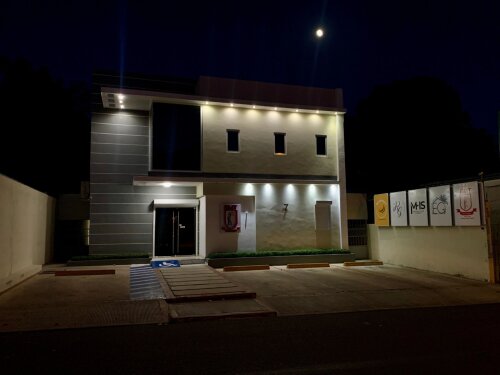Best Lawsuits & Disputes Lawyers in La Romana
Share your needs with us, get contacted by law firms.
Free. Takes 2 min.
List of the best lawyers in La Romana, Dominican Republic
About Lawsuits & Disputes Law in La Romana, Dominican Republic
Lawsuits and disputes in La Romana, Dominican Republic, are governed by a combination of national laws and local court procedures. Residents, businesses, and visitors may encounter legal conflicts ranging from contractual disagreements to property matters and personal injury cases. Legal disputes can be handled through negotiation, mediation, or litigation in the local courts. Understanding the legal landscape is essential for protecting your rights and reaching a fair resolution.
Why You May Need a Lawyer
Legal conflicts can arise unexpectedly and may involve areas such as real estate transactions, inheritance, employment issues, breach of contract, or even family disagreements. In La Romana, the assistance of a knowledgeable lawyer can help you navigate the complexities of the Dominican legal system, participate effectively in negotiations, or represent your interests in court. Common reasons to seek a lawyer include:
- Property or land disputes
- Breach of contract between businesses or individuals
- Eviction or landlord-tenant issues
- Collection of unpaid debts
- Inheritance and succession conflicts
- Personal injury claims
- Family law matters (divorce, child custody, etc.)
- Business partnership disagreements
- Consumer rights violations
- Defamation or damage to reputation
Local Laws Overview
La Romana, as part of the Dominican Republic, follows the country’s civil law system, which is influenced by European (mainly French and Spanish) legal codes. Some key aspects relevant to lawsuits and disputes include:
- Civil Code: The Dominican Civil Code outlines general rules for civil obligations, contracts, property rights, and family law. Dispute resolution relies heavily on these statutes.
- Commercial Code: Business and commercial disputes are regulated by the Commercial Code, which addresses partnerships, company formation, and contractual obligations.
- Judicial System: Disputes are typically heard in the courts of first instance (Tribunal de Primera Instancia), with appeals possible at higher levels. Specialized courts may handle specific matters like labor or family law.
- Mediation & Arbitration: Alternative dispute resolution is encouraged and often a requirement before entering litigation for some cases.
- Deadlines: Legal actions are subject to statutes of limitations, meaning there is a fixed period in which you must bring a claim.
It is crucial to consult with a local lawyer who is registered with the Dominican Bar Association and familiar with La Romana’s court processes.
Frequently Asked Questions
What types of disputes can be resolved in La Romana courts?
Courts in La Romana handle civil, commercial, family, real estate, labor, and criminal disputes. Most common civil lawsuits involve property, contracts, debts, or inheritance.
Do I need to speak Spanish to file a lawsuit?
Spanish is the official language used in courts and legal documents. Non-Spanish speakers should hire an attorney who can represent them and manage translations.
Can foreigners file lawsuits in La Romana?
Yes, both residents and foreigners-whether individuals or companies-can initiate or respond to lawsuits and disputes in La Romana, as long as they follow Dominican legal procedures.
How long does it take to resolve a lawsuit?
The timeline varies depending on the complexity of the case, court schedules, and the willingness of parties to reach an agreement. Simple disputes may take a few months, while complex cases may last a year or longer.
Is mediation required before going to court?
For certain types of cases, especially family matters and some civil disputes, the parties may be required to attempt mediation before proceeding to court. Mediation is encouraged to save time and reduce costs.
What evidence do I need for my case?
Relevant contracts, written communications, receipts, photographs, witness statements, and expert reports are commonly used. A lawyer can advise you on what documents will strengthen your case.
Do I have to appear in person at the court?
In most cases, personal appearance is required, especially if you are testifying. In some situations, your lawyer may represent you. Remote testimony may be possible with advance court approval.
What are the typical costs involved in a lawsuit?
Costs include lawyer fees, court filing fees, expert witness fees, and possible administrative expenses. Ask your lawyer for an estimate before proceeding.
Can a lawsuit decision be appealed?
Yes, unfavorable decisions can usually be appealed to a higher court within a specified period. Consult your lawyer promptly after a decision is rendered to meet deadlines.
How do I find a reputable lawyer in La Romana?
Look for lawyers registered with the Dominican Bar Association, seek recommendations, or contact local legal aid offices. It is important to choose someone with experience in your specific type of dispute.
Additional Resources
If you are seeking legal advice or support regarding lawsuits and disputes in La Romana, consider these resources:
- La Romana Bar Association - Offers lists of certified lawyers and provides referrals.
- Dominican Republic Judiciary (Poder Judicial) - Information about court locations, case filing, and processes.
- Public Prosecutor’s Office - For guidance on criminal or public interest cases.
- National Office of Legal Assistance (ONAL) - Provides free or low-cost legal help to qualified individuals.
- Local law clinics and nonprofit organizations involved in legal education and mediation services.
Next Steps
If you are facing a legal dispute or considering a lawsuit in La Romana, it is crucial to act promptly. Here’s how you can begin:
- Document all details related to your dispute, including dates, communications, and any relevant evidence.
- Reach out to a local lawyer for an initial consultation to evaluate your options and the strengths of your case.
- Discuss mediation or alternative dispute resolution as a way to resolve your conflict before resorting to litigation.
- Gather necessary documents and information as advised by your lawyer.
- Follow your lawyer’s guidance on filing procedures and court appearances.
Taking informed and timely steps greatly increases your chances of achieving a favorable resolution to your lawsuit or dispute in La Romana, Dominican Republic.
Lawzana helps you find the best lawyers and law firms in La Romana through a curated and pre-screened list of qualified legal professionals. Our platform offers rankings and detailed profiles of attorneys and law firms, allowing you to compare based on practice areas, including Lawsuits & Disputes, experience, and client feedback.
Each profile includes a description of the firm's areas of practice, client reviews, team members and partners, year of establishment, spoken languages, office locations, contact information, social media presence, and any published articles or resources. Most firms on our platform speak English and are experienced in both local and international legal matters.
Get a quote from top-rated law firms in La Romana, Dominican Republic — quickly, securely, and without unnecessary hassle.
Disclaimer:
The information provided on this page is for general informational purposes only and does not constitute legal advice. While we strive to ensure the accuracy and relevance of the content, legal information may change over time, and interpretations of the law can vary. You should always consult with a qualified legal professional for advice specific to your situation.
We disclaim all liability for actions taken or not taken based on the content of this page. If you believe any information is incorrect or outdated, please contact us, and we will review and update it where appropriate.
Browse lawsuits & disputes law firms by service in La Romana, Dominican Republic
La Romana, Dominican Republic Attorneys in related practice areas.












